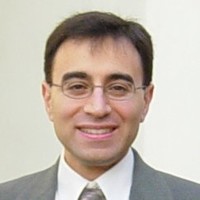
Walid Houry
- Courses2
- Reviews3
- School: University of Toronto
- Campus: St. George Campus
- Department: Biochemistry
- Email address: Join to see
- Phone: Join to see
-
Location:
Toronto, ON - Dates at University of Toronto: September 2006 - November 2016
- Office Hours: Join to see
Biography
University of Toronto St. George Campus - Biochemistry
Professor at University of Toronto
Higher Education
Walid
Houry
Toronto, Ontario, Canada
The ultimate aim of my research is to address the fundamental question of how molecular chaperones modulate protein folding in the cell. To this end, we study the role of molecular chaperones in maintaining protein homeostasis using E. coli and yeast as model systems. We are also mapping what we call the chaperone interaction networks in yeast with the ultimate aim of identifying the rules that govern protein folding processes in the cell. Our group employs a wide range of approaches including biochemical, biophysical, proteomics, and bioinformatics tools. The three main streams of research in my laboratory can be summarized as follows:
1. The role of molecular chaperones and enzyme decarboxylases in the acid stress response of E. coli. Our work in this field sheds novel insights into bacterial infectivity.
2. Analysis of the biochemical and biological functions of the essential chaperone-helicase complex Rvb1/2. Rvb1/2 are members of a large number of essential complexes in the cell including chromatin remodeling complexes and telomerase complex. They have been implicated in cancer etiology. Our group is interested in understanding the function of these helicases in ribosomal RNA processing. This project sheds further insights into the role of Rvb1/2 in cancer.
3. Mapping chaperone interaction networks. In this project, we are carrying out systematic mapping of the chaperone interaction networks in yeast using a wide range of proteomic and genomic methods. The ultimate goal of the project is to determine the mechanisms that govern protein homeostasis inside the cell.
Experience
Cornell University
Graduate student
Walid worked at Cornell University as a Graduate student
Cornell University
Graduate student
Walid worked at Cornell University as a Graduate student
Sloan-Kettering Institute
Postdoctoral fellow
Studied the GroEL/ES chaperone system.
Max-Planck-Institute for Biochemistry
Postdoctoral fellow
Studied the GroEL/GroES and the DnaK/J/GrpE chaperone systems.
University of Toronto
Professor
My research has concentrated on studying molecular chaperones and protein degradation systems using Biochemistry, Biophysics, Proteomics, and Bioinformatics.
Education
Cornell University
Doctor of Philosophy (PhD)
Chemistry
Cornell University
Master of Science (MSc)
Chemistry
Cornell University
Graduate student
Cornell University
Graduate student
Publications
Nutritional status modulates box C/D snoRNP biogenesis by regulated subcellular relocalization of the R2TP complex
Genome Biology 2014, 15:404
